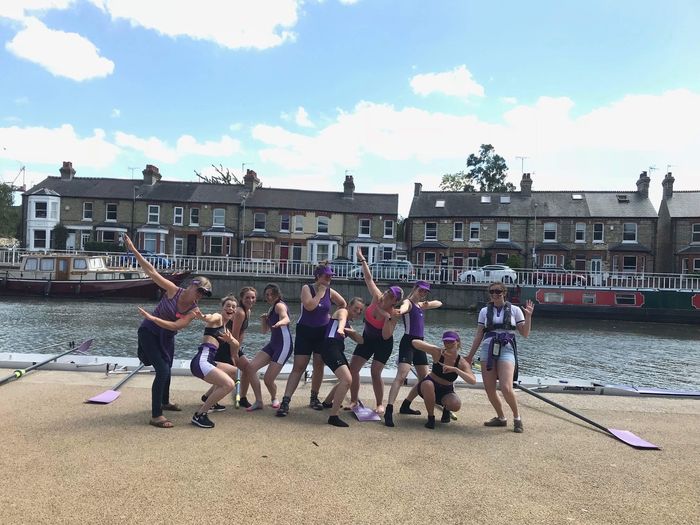Nobody said it was easy
Ashna Ahmad appreciates the University’s challenging academic environment, and the unforgettable friendships she made in her Love Letter to Cambridge

As a teenager, a recurring theme in my last few wakeful thoughts each night was that my life seemed too ‘easy’. Bundled snugly in bed, duvet pressed against my chin, with nothing but the soft hum of the heating in the background as the quiet, suburban streets around my house settled into sleep, it was so tempting to believe that all was right with the world – and so, as a consequence, something bad had to happen soon.
This does not mean that my life was perfect at this time; the endless rhythm of school, homework, sleep was painfully boring, and my social life left much to be desired. Drowsily, I would think back to how few substantial conversations I’d had during the day, or think forward to whether I would bother nagging someone to meet up so that I would have some semblance of weekend plans. This stretch of my life was vaguely comfortable, yet empty – motionless. At least a catastrophe would have broken the silence, I thought.
Love Letters to Cambridge
These are tough and uncertain times for us all, and a lot of us are left with little closure. Varsity are launching this series to give a platform to students reflecting on the parts of Cambridge they'll miss the most, and to gain some closure through writing. Just email our Features team with a 150-word pitch with your idea!
Well, now we have our catastrophe. I can picture how I would have reacted to the news of a pandemic (and the accompanying school closures) in Year 12: obviously with fear and worry, but not without a twinge of excitement. The prospect of missing months and months of school and freeing up the time and energy to work on something self-motivated would have been a sudden injection of independence into my life. Staying driven enough to complete a project without any extrinsic goals or assessments represented much more of a challenge than the mindless task-execution of the school day.
Fast forward two years, though, and an extra dose of difficulty does not seem like what I need. My first two terms at Cambridge have been a blur of chaotic nights out and equally chaotic nights in the library; I kept myself almost unhealthily busy, and barely had the time to register my sleep deprivation. I found my challenge. All the while, I have been having unforgettable conversations on a daily basis. The sheer density of incredibly passionate and perceptive people, who all have different interests, perspectives and stories but are still like-minded in so many ways, make for the best discussions – whether fuelled by vodka at 2am or over lunch after an otherwise unremarkable morning of lectures. I spent years at school longing for the ‘difficulty’ of university life, the faster pace and greater independence, but my friends have had, by far, the greatest impact on me out of anything I’ve experienced here.
“My first two terms at Cambridge have been a blur of chaotic nights out and equally chaotic nights in the library”
It was because of these friends, and the enriching conversations we had, that I began to reflect upon my pre-Cambridge days. During sixth form, I rarely opened up to anyone, which meant that I rarely opened up to myself. Situations at school were ‘easy’ because I never fully engaged with them; my friendships were ‘easy’ and fruitless because I did not invest in them, and did not dare to risk the trust and mutual vulnerability which make them more complex. I emotionally insulated myself, putting myself so out of touch with my own feelings that I mistakenly characterised the resulting emptiness as ‘too easy’.
What I owe Cambridge most of all is my ability to open up again. Finding people I can be vulnerable with has been transformative, for my general emotional well-being and for the understanding of my own needs and desires. If my life had truly been ‘too easy’ during sixth form, I would not have felt starved of anything – but I was positively ravenous for a challenge to break up the monotony of school. And if anyone’s life feels so easy that it feels empty, something has probably gone wrong.
In this period of quarantine, most of us will have much more time spent alone with our thoughts than we are used to. Thinking yourself into negativity can quickly lead to a downward spiral. And so it is more important than ever to be honest with ourselves, and be able to make sense of how we feel.
So, thank you, Cambridge – thanks to you, I might not be nearly as excited for a six-month break from university as I would have been for a six-month break from school, but I am better-equipped to cope with one.
 News / Clare Hall spent over £500k opposing busway 24 December 2025
News / Clare Hall spent over £500k opposing busway 24 December 2025 Comment / The ‘class’ of Cambridge24 December 2025
Comment / The ‘class’ of Cambridge24 December 2025 News / Caius mourns its tree-mendous loss23 December 2025
News / Caius mourns its tree-mendous loss23 December 2025 Comment / League tables do more harm than good26 December 2025
Comment / League tables do more harm than good26 December 2025 News / Girton JCR publishes open letter expressing solidarity with Palestine25 December 2025
News / Girton JCR publishes open letter expressing solidarity with Palestine25 December 2025










